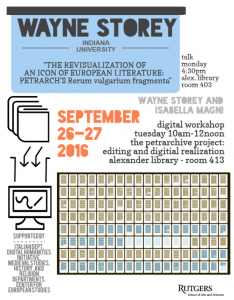
A workshop on TEI and the construction of digital editions
Tuesday, September 27, 2016, 10:00 am – 12:00 pm
Alexander Library, room 413
Facilitators: Wayne Storey and Isabella Magni
RSVP to Francesca Giannetti at francesca.giannetti@rutgers.edu
 While the compositional and historical complexities of Petrarch’s collection of lyric poems, the Rerum vulgarium fragmenta (1362-1374), seem to recommend crowding the page with the latest digital bells and whistles, the Petrarchive‘s operational philosophy for presenting the work’s intricate visual poetics is to keep the text clean and simple. Rather, behind each ‘page’ is a structural design that is carefully documented in the project’s wiki and implemented using the Text Encoding Initiative‘s dialect of the eXtensible Markup Language (XML). This workshop examines the theoretical and practical design features and tools of our “rich-text” digital edition of one of the masterworks of Western Literature.
While the compositional and historical complexities of Petrarch’s collection of lyric poems, the Rerum vulgarium fragmenta (1362-1374), seem to recommend crowding the page with the latest digital bells and whistles, the Petrarchive‘s operational philosophy for presenting the work’s intricate visual poetics is to keep the text clean and simple. Rather, behind each ‘page’ is a structural design that is carefully documented in the project’s wiki and implemented using the Text Encoding Initiative‘s dialect of the eXtensible Markup Language (XML). This workshop examines the theoretical and practical design features and tools of our “rich-text” digital edition of one of the masterworks of Western Literature.
Dr. H. Wayne Storey and doctoral candidate Isabella Magni will lead this hands-on workshop on TEI and the construction of digital editions. They will provide a brief overview of some of the conceptual aspects of scholarly digital editions and proceed to practical and technical considerations and exercises using the structures of the Petrarchive as an example.
The workshop will take place in Alexander IHL 413, a multimedia classroom with PCs. Participants will use the oXygen XML Editor, which is installed on the machines. If a personal laptop is preferred, please install oXygen and request a 30-day free trial. The DH Lab, also on the fourth floor of Alexander, can be used for continued practice with and use of the oXygen XML Editor.
Note added 10/4/2016: Isabella’s training materials are available at http://dcl.slis.indiana.edu/teiworkshop/. Project documentation for the Petrarchive is available on their wiki.
Note: For information on Storey’s lecture the evening before, see The Revisualization of an Icon of European Literature: Petrarch’s Rerum vulgarium fragmenta.
This event is supported by the departments of Italian, History, and Religion, the program in Medieval Studies, the Center for European Studies, the Libraries, and the Digital Humanities Initiative.
